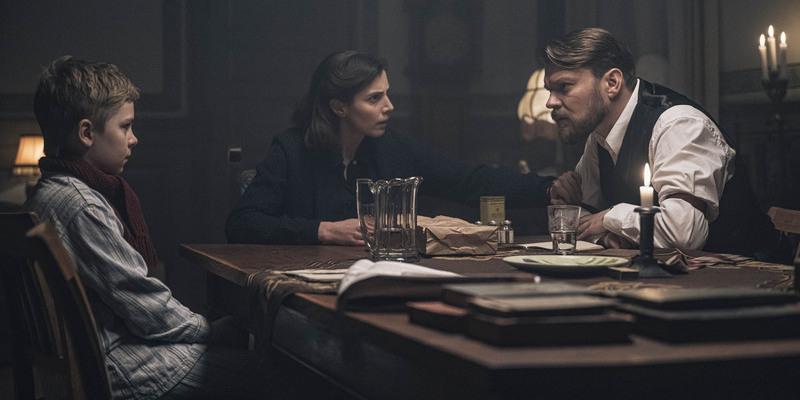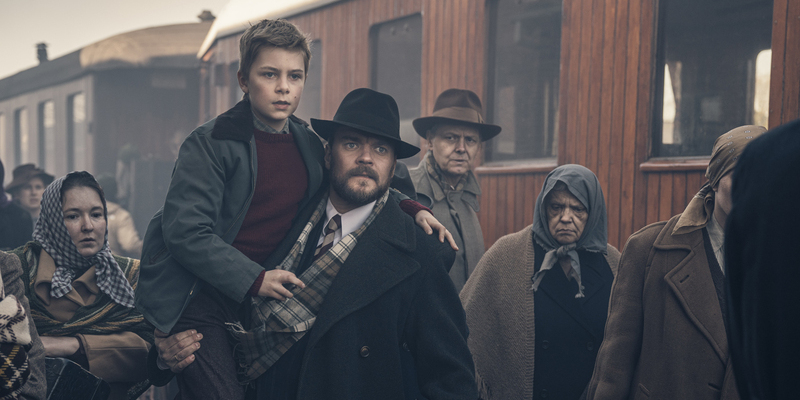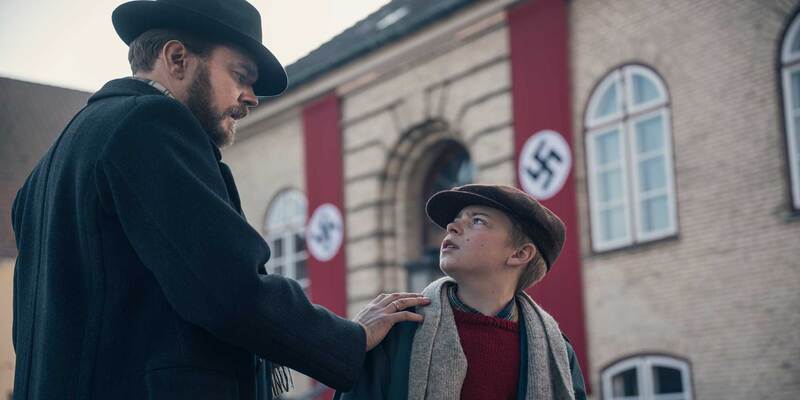
During WWII a Danish family faces a moral dilemma when their school
becomes home to German refugees.
Review by
Benjamin Poole
Directed by: Anders Walter
Starring: Pilou Asbæk, Katrine Greis-Rosenthal, Morten Hee Andersen, Peter Kurth,
Ulrich Thomsen
Everyone imagines that when the time comes they'll be the hero; if push
comes to shove, they'll do the right thing, take the decisive action and
save the fucking day. Easier envisioned than enacted, though, I reckon, as
our inherent sense of self-preservation, along with good old inertia,
ultimately disabuses us of getting in harm's way or jeopardising social
status. It is grating when people smugly wheel out that adage about evil
only thriving when good people do nothing yet there is persistent truth in
the cliché. Self-aggrandisement aside, how many of us would admit that,
actually, in the moment, we are far more likely to make the decision more
convenient to us, despite the unfortunate ramifications our inaction may
have for others? (Perhaps ask the commuters on this morning tube journey).
Easy to imagine yourself the hero. Easy fantasy. Comforting, too,
especially to a mind conditioned by the simple plot trajectories of
popular narrative cinema. In complex contrast, Anders Walter's
(with story by Miriam Nørgaard) Second World War set
Liberation (original Danish title, 'Before it Ends', which I
prefer for its anxious temporality) is based on true events, which are
multi-faceted by nature and wherein morality is subjective.

Seeing their neighbours as fellow Aryans, Nazi Germany was, for the most
part, alright with Denmark. The countries made for awkward bedfellows,
though. Denmark did co-operate with Germany (the perceived might of the
German military would mean loss of life), yet the resolve of certain Danes
regarding Nazi race policy stands tall. Problem was, though, that when
Russia made further inroads towards Berlin, around 250,000 Germans escaped
north seeking asylum in occupied Denmark. This is where the complications
set in and where Liberation picks up. Were the refugees
casual sympathisers with lebensraum, or, worse, actual nazis? Or are they
victims of a government which was dependent upon an Enabling Act
effectively outlawing democracy? If Denmark hadn't capitulated and the
jackboot had been on the other foot, how many Danish lives would have been
lost to the German army?
Such uneasy dynamics characterise the 1945 set Liberation, where we focus in on the microcosm of small town Ryslinge and high
school principal Jacob (Pilou Asbæk - a more wholesome Michael
Shannon) who has been instructed to harbour 500 refugees in his halls. We
open with Jacob instructing his son Søren (Lasse Peter Larsen) how
to tie a flag (the best part of being Danish? Well, the flag is a big
plus...), establishing not only notions of recouped identity but the
influential relations between adult and child, too. The Soviets are
getting closer to the German capital, and it looks as if the war is coming
to an end: only a few moments into Liberation, Walter creates a palpable sense of relief. It doesn't last, however.
Following whispers of a factory bombed by the Danish resistance, the town
doctor is shot point blank for his presumed involvement, right in front of
Søren. While some Germans may be in need of safety, the most visible enact
a nightmare regime on the town.

What ensues is an utterly plausible drama, which takes its time to depict
its inexorable descent into chaos, occurring so slowly, yet surely, nobody
realises what is happening until it's too late. Rasmus Heise's
cinematography is staid, almost monochrome in its bright use of natural
light picking out shadowy rooms where Jacob and his wife Lis (Katrine Greis-Rosenthal) fret over their responsibility to the town, to their family and to
their own humanity. The town estrange them, seeing the family as Nazi
sympathisers, which culminates in schoolkids viciously bullying Søren and
their parents deliberately othering Jacob and wife (it isn't just Germans
circa 1940 who are capable of tyranny, Liberation suggests).
Walter and Nørgaard often frame events through the experiences of Søren
yet avoid trite "innocence lost" motifs, chiefly because the boy doesn't
have a better sense of how to react any more than the compromised adults
do. What he does have is the instinctive immediacy of a child, where
emotion overrides all other sensibilities. This leaves Søren open to
radicalisation by the town's more motivated, disillusioned residents: the
iconography of the third act, where things really do descend re the people
of Ryslinge, deliberately invokes the very Nazis which the Danes are
supposedly in opposition to.

The closing credits of Liberation are a testament to the
many lives lost during this relocation. In Ryslinge, 62 refugees died, 27
of that number were children. Across the country, 10,942 died and 6,540
were children. Little kids, who would have had little idea of what the war
involved and absolutely no agency regarding it. Walter's film is a deeply
disconcerting, and timely, reminder that while most of us may fantasise
about being a hero we more often end up defaulting to villain.
Liberation is on UK/ROI VOD from
January 29th.


